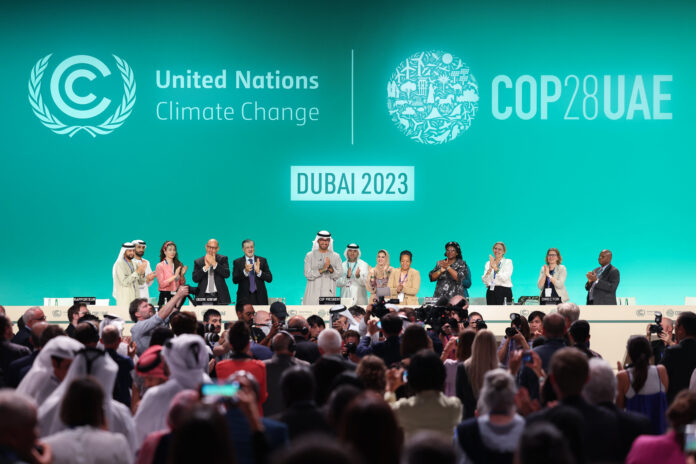The COP28 climate summit in Dubai concluded with a historic yet underwhelming agreement, the UAE Consensus, which finally acknowledges the need to move away from fossil fuels. However, this landmark decision is overshadowed by significant loopholes that allow the fossil fuel industry to continue thriving, posing a direct conflict with the critical targets of the Paris climate agreement.
While the agreement calls on nations to triple renewable energy by 2030, phase down “unabated coal power,” and transition away from fossil fuels, its language is riddled with escape hatches. For climate advocates who have long pushed for a decisive fossil fuel phaseout, the UAE Consensus is a far cry from the urgent action required as global greenhouse gas concentrations continue to rise and extreme weather events become increasingly devastating.
Jean Su from the Center for Biological Diversity aptly points out that while the agreement brings the issue of ending fossil fuels into the spotlight, its numerous loopholes fall short of the transformational action needed to combat the climate crisis. The Alliance of Small Island States, particularly vulnerable to climate change, voiced their disappointment, highlighting their absence from the room when the final text was adopted.
The agreement’s language on transitioning away from fossil fuels is ambiguous, with loopholes that potentially underwrite further fossil fuel expansion. It controversially endorses “transition fuels” and technologies like carbon capture, which critics label as a lifeline for the fossil fuel industry.
Kaisa Kosonen from Greenpeace International sees this as a missed opportunity for a historic deal. However, she remains hopeful that the collective determination of countries, businesses, and civil society can still drive the fossil fuel phaseout, especially by halting current expansion plans threatening the 1.5°C limit.
The summit’s host, a major oil-producing state, and the record presence of oil and gas lobbyists, unsurprisingly left their mark on the final text. Nikki Reisch from the Center for International Environmental Law criticizes the process that allows a few countries and the fossil fuel industry to impede progress.
The disappointing outcome extends to climate finance, with the U.S., the largest historical emitter, committing a meager $17.5 million to a global loss and damage fund. This lack of substantial support for developing countries in their transition to renewable energies and coping with climate impacts is a glaring oversight.
Nafkote Dabi of Oxfam International laments this failure, pointing out the dire consequences for developing countries and poorer communities. With no significant financial assistance, these regions are left to face increasing debt, inequality, and the devastating effects of climate change.
COP28’s conclusion, therefore, reflects a missed opportunity for meaningful climate action, dominated by the interests of the fossil fuel industry and insufficient commitments from major polluters. The world, especially the most vulnerable, remains on a perilous path, urging the need for alternative forums to manage the decline of fossil fuels and for rich countries to step up their climate finance commitments.



